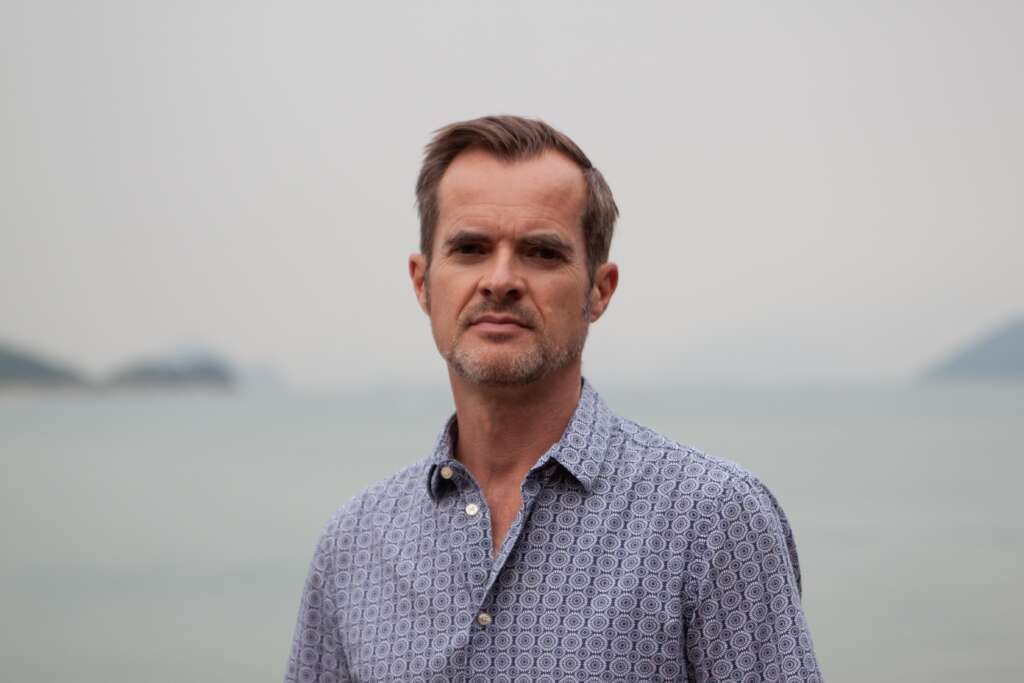Imagine swimming alongside a graceful predator that has roamed the seas since before the dinosaurs. Sharks have found an unexpected champion in Andy Cornish, whose two decades of dedication to their conservation have made him a pivotal figure in Hong Kong’s environmental scene. From his early experiences in conservation to his perspectives on the climate crisis, we unpack some interesting topics.
In the familiar narrative of sharks being unfairly vilified and endangered species facing extinction, the call to action often revolves around raising awareness or abstaining from consuming shark fin soup. Yet, the harsh reality of witnessing these majestic creatures vanish prompts a deeper exploration of the root causes and effective solutions necessary to safeguard marine biodiversity.
Enter: Andy Cornish. Andy Cornish has accumulated over twenty years of experience in conservation. He has established his own consultancy, Cornerstone Ecology, aimed at bolstering conservation efforts in Hong Kong. He has emerged as a pivotal figure in Hong Kong’s conservation landscape.

“Human behaviour is at the root of all the problems”
When it comes to shark conservation, the perceptions of ordinary individuals often mirror broader attitudes towards environmental protection. While many recognise the importance of preserving these apex predators and their ecosystems, the intricacies of marine conservation can feel distant amidst the hustle and bustle of daily life.
Sharks, often unfairly demonised and misunderstood, may evoke a mix of fear and fascination, further complicating public perceptions of their conservation needs. While some may view shark conservation as a specialised field best left to experts, there’s a growing recognition of the critical role these creatures play in maintaining the health of our oceans. Yet, bridging the gap between awareness and tangible action remains a challenge as individuals grapple with how to meaningfully contribute to the preservation of these magnificent creatures and their habitats.
“I’ve been working on sharks, and human behaviour is at the root of all the problems. I think the fascination is particularly acute on the media side of things. Any kind of attack or fatality, certainly in a Western country, immediately becomes major news.” Andy discusses with Sean Lee-Davies in Episode 16 of the Our Future Nature Podcast.
He characterises conservation as the endeavour to safeguard and maintain the natural environment, encompassing both wildlife and ecosystems, with the aim of benefiting both current and forthcoming generations. He underscores the significance of comprehending human behaviour as a fundamental factor contributing to conservation hurdles, especially concerning sharks and marine biodiversity.
He emphasises that the media’s intense focus on sharks, especially in the wake of attacks or fatalities, amplifies fear and fosters negative perceptions. Furthermore, Cornish highlights the role of human actions, such as overfishing, as a fundamental driver of conservation issues, noting that this practice is widespread yet often overlooked. Additionally, he discusses the detrimental impact of popular culture, citing movies like Jaws and similar narratives that depict sharks as ruthless killers, thus diminishing public interest in their conservation efforts. “It’s quite unbelievable. When I went to see Top Gun the other day, there was a trailer for some ridiculous film that just compounded the misinformation about sharks. It’s not based on fact. Because of this, they don’t get as much conservation attention from the public as they should,” he adds.
This also puts into perspective how influential the media is and how it can dramatically shape the reputation of even animals, highlighting the profound impact of storytelling on public perception.
Rays are essentially flat sharks
On the other hand, it’s not all about sharks as well. Andy Cornish notes that rays, which are essentially flattened sharks, first appeared around 50 million years ago. He adds that both rays and sharks play a crucial role in shaping ocean ecosystems, warning that their removal could disrupt the delicate balance of marine environments.
“While we don’t understand the ecological role of all of them, they really have sort of shaped the ocean, you know, for millions of years, even prior to the species that you commonly see today, if you go diving on a coral reef, I mean, they’re much, much newer inhabitants.” Andy explains a bit about rays.
Both sharks and rays are predatory species that have shaped the oceans for millions of years. These species have played a crucial role in controlling populations of various marine life forms, some of which are now extinct. “Including those species of dinosaurs that used to swim and if you go back farther than sort of 100 years ago” Andy adds. He also notes that removing sharks from the ocean could disrupt the ecological balance in ways that are not yet fully understood.
Andy also highlights the importance of conserving these species in the face of widespread overfishing and declining shark populations, stressing the urgent need to protect them for the health of marine ecosystems.“So, these perceptions of sharks that we talked about earlier if we can get that silliness out of the way and get people to realise that it really is this next decade, which is going to make the difference between whether we save all these species that have been around for so long and try to sort of recover and update the ocean.” he clarifies.
“Sharks and climate change, this is pretty far-fetched stuff, right?”
So, how are sharks related to climate change? He explains that healthy shark populations are crucial for maintaining the food chain, especially in coastal communities where sharks are part of the diet. Cornish cites an Australian study showing that the presence or absence of tiger sharks influences the behaviour of sea turtles and dugongs.
In Shark Bay, researchers have long been examining the dynamic between tiger sharks, a common presence in the bay, and the sea turtles and dugongs they prey on. What they’ve discovered, in simplified terms, is that without tiger sharks present, the sea turtles and dugongs tend to overconsume seagrass, depleting it down to the bare layer.
However, when tiger sharks are in the vicinity, there’s a natural apprehension among the turtles and dugongs, as they are potential prey. This fear factor prompts them to constantly move around, resulting in less overgrazing of the seagrass. This behaviour significantly impacts the seagrass’s ability to sequester carbon dioxide.This highlights the interconnectedness of shark populations with marine ecosystem health in the context of climate change.
Sharks, frequently cast as antagonists in various narratives, often endure being sidelined and overlooked. However, the dire situation confronting shark populations, perilously close to extinction due to severe threats, demands urgent action. Human-induced factors like overfishing and unsustainable practices have accelerated this decline, underscoring the imperative for immediate conservation measures. The podcast stresses the critical significance of raising awareness, advocating responsible seafood consumption, and enacting effective conservation strategies to safeguard sharks and uphold marine biodiversity. By responding to these urgent calls to action, we can work towards reversing the downward trajectory and securing a sustainable future for these majestic creatures and our oceans.
“The next ten years are absolutely critical. Otherwise, we’re definitely going to start to see a whole swathe of other species get down to levels that either can’t be recovered or they just disappear” Hopefully, we won’t ever have to reach that point.
By the way….
If this piqued your interest, we’re more than happy to let you know that Andy Cornish dives even deeper into sharks, biodiversity, conservation, and everything else in between in Episode 16 of the Our Future Nature Podcast, hosted by Sean Lee-Davies. Listen to the full episode on Spotify. If you’re seeking organisations to support shark conservation efforts, consider The Shark Trust, PADI Aware Foundation, and WildAid among the numerous organisations dedicated to this cause.
FEATURED IMAGE: Pexels


